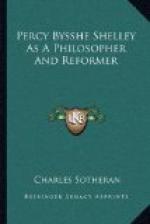Of safe assassination, and all crime
Made stingless by the spirits of the Lord.
And blood-red rainbows canopied the land.
Spirit! no year of my eventful being
Has pass’d unstain’d by crime and misery,
Which flows from God’s own faith. I’ve marked his slaves
With tongues whose lies are venomous, beguile
The insensate mob, and whilst one hand was red
With murder, feign to stretch the other out
For brotherhood and peace; and that they now
Babble of love and mercy, whilst their deeds
Are marked with all the narrowness and crime
That freedom’s young arm dare not yet chastise?”
Protestant Christians may urge that all this is not Christianity; if it be not—for it is the record of the Church—I would ask, what is? and where shall we find the history of Christianity for the fifteen centuries before Luther’s time? and where, to-day? Their predecessors plucked the plumage from the dying bird of mythology, as they, themselves, have robbed the liberal orchard of all its choicest fruits and palmed them off as of their own growth. Protestants would not, I dare say, now countenance the persecutions of the past, but yet, I would tell them that their Protestantism has been a great mistake; and that, at this moment, there is no unity among the opposers of Catholicism, who are split into a thousand sects, wrangling for superiority, like wolves over offal; and that their churches are gradually converging toward Rationalism on the one hand, and Catholic Sacerdotalism on the other; in regard to which last, the Historical Roman Church—the only Christian body which presents a solid phalanx—one must not be too iconoclastic, remembering that, in the monastic houses and great ecclesiastical libraries we have had conserved for us, although, perchance by accident, the records of all the philosophy, all the jurisprudence, all the polity, all the literature, and all the civilization of ancient Greece and Rome, that remained from the Alexandrian library and pre-Christian times—the mediaeval clerics were the great conservators of knowledge, which we inherit directly from Europe; and we should be, therefore, grateful to them equally with Mohammedanism, from which we received, through the Crusaders and the Moors, the basis of nearly all science and luxury, from Asia. There were, undoubtedly, many bad popes, men as bad as the incestuous, and, according to the recent dogma, the infallible Alexander Borgia; priests who are not all vile, but many nobler than their system, acknowledge this with regret, and among whom there are some whom I can reverence, such as John Henry Newman, for instance, whose life would favorably compare with that of Shelley, or any liberal. There have been popes, also, whose lives have been as pure, as disinterested, and as virtuous as that of any stoic or epicurean. We owe much to Sixtus the Fifth, founder of the Vatican




